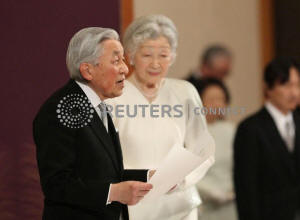|
Japan's emperor prays for peace in first
abdication in 200 years
 Send a link to a friend
Send a link to a friend
 [April 30, 2019]
By Linda Sieg and Kiyoshi Takenaka [April 30, 2019]
By Linda Sieg and Kiyoshi Takenaka
TOKYO (Reuters) - Japanese Emperor Akihito,
in his final remarks as his three-decade reign drew to a close on
Tuesday, thanked the people for their support and expressed hope for a
peaceful future.
Akihito, 85, the first monarch to abdicate in two centuries, had sought
to ease the painful memories of World War Two and bring the monarchy
closer to the people, including those marginalized in society.
The popular Akihito was the first monarch to take the Chrysanthemum
Throne under a post-war constitution that defines the emperor as a
symbol of the people without political power.
His father, Hirohito, in whose name Japanese troops fought World War
Two, was considered a living deity until after Japan's defeat in 1945,
when he renounced his divinity.
"To the people who accepted and supported me as a symbol, I express my
heartfelt thanks," Akihito, wearing a Western-style morning coat, said
at a brief abdication ceremony in the Imperial Palace's Matsu no ma, or
Hall of Pine.

"Together with the empress, I hope from my heart that the new Reiwa era
that begins tomorrow will be peaceful and fruitful, and pray for the
peace and happiness of our country and the people of the world," said a
solemn Akihito, referring to the new imperial era.
Standing on a white dais flanked by Empress Michiko, who wore a long
white and gray dress, Akihito bowed after he spoke.
About 300 people attended the ceremony broadcast live on television.
They included Prime Minister Shinzo Abe, Crown Prince Naruhito and Crown
Princess Masako, as well as the heads of both houses of parliament and
Supreme Court justices.
Akihito, together with Michiko, his wife of 60 years and the first
commoner to marry an imperial heir, carved out an active role as a
symbol of reconciliation, peace and democracy.
Akihito, who has had treatment for prostate cancer and heart surgery,
said in a televised address in 2016 that he feared his age would make it
hard for him to carry out his duties fully.
At the start of the ceremony, chamberlains carried the state and privy
seals into the hall along with two of Japan's "Three Sacred Treasures" -
a sword and a jewel - which together with a mirror are symbols of the
throne. They are said to originate in ancient mythology.
"While keeping in our hearts the path that the emperor has walked, we
will make utmost efforts to create a bright future for a proud Japan
that is full of peace and hope," Abe said ahead of the emperor's
remarks.
At the end of the ceremony, Akihito descended from the dais and took
Michiko's hand as she stepped down. Before exiting the room, he paused,
turned toward the audience and bowed again.
Earlier, Akihito performed a ritual announcement of his abdication in
three palace sanctuaries, including one honoring the sun goddess
Amaterasu Omikami, from whom mythology says the imperial line is
descended, and two others for departed emperors and Shinto gods.
[to top of second column]
|

Japan's Emperor Akihito, flanked by Empress Michiko, delivers a
speech during a ritual called Taiirei-Seiden-no-gi, a ceremony for
the Emperor's abdication, at the Imperial Palace in Tokyo, Japan
April 30, 2019. Japan Pool/Pool via REUTERS

NHK television showed Akihito, wearing a dark orange traditional
robe and black headdress, walking slowly into the first sanctuary
with a white-robed courtier holding the train and another carrying a
sword. Naruhito conducted a similar ceremony.
NEW ERA
Crowds gathered outside the Palace, a 115-hectare compound in the
heart of Tokyo protected by moats and walls, that is home to the
emperor and empress. Security was tight with several thousand police
officers on duty in Tokyo, media reports said.
"I think the emperor is loved by the people. His image is one of
encouraging the people, such as after disasters, and being close to
the people," said Morio Miyamoto, 48.
"I hope the next emperor will, like the Heisei emperor, be close to
the people in the same way," he said.
The Heisei imperial era, which began on Jan. 8, 1989 after Akihito
inherited the throne, saw economic stagnation, natural disasters and
rapid technological change.
Not everyone was excited by the imperial changeover.
"It's a normal day. That kind of political stuff is irrelevant to us
ordinary people," said Masato Saito, a 40-year-old construction
worker.
"As long as they make our lives easy to live, that's all I care."
U.S. President Donald Trump and First Lady Melania offered their
"heartfelt appreciation" to the royal pair in a statement.
Naruhito, 59, will inherit the throne in ceremonies on Wednesday. He
studied at Oxford and together with his Harvard-educated wife,
Masako, will give the monarchy a cosmopolitan flavor.

Akihito officially remains emperor until midnight, when the new
Reiwa era, meaning "beautiful harmony", begins. Informal countdown
events for the start of the new era were scheduled for Tuesday
evening.
Japanese traditionally refer to the date by the era name, or "gengo",
a system originally imported from China, on documents, calendars and
coins but many people also use the Western calendar.
(Additional reporting by Malcolm Foster and Elaine Lies; Editing by
Robert Birsel, Paul Tait and Darren Schuettler)
[© 2019 Thomson Reuters. All rights
reserved.]
Copyright 2019 Reuters. All rights reserved. This material may not be published,
broadcast, rewritten or redistributed.
Thompson Reuters is solely responsible for this content. |